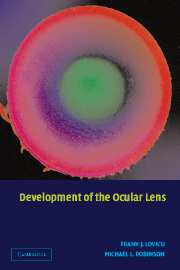Preface
Published online by Cambridge University Press: 30 January 2010
Summary
Like the beginning of the 20th century, the dawn of the 21st century is witnessing tremendous advances in developmental biology. Research on ocular lens development remains at the forefront of these advances, just as it was in 1900. The difference between then and now lies in the current synergism between developmental biology, genetics, and molecular biology that has led to the identification of the very molecules responsible for many of the inductive processes only descriptively defined earlier.
The period from the first descriptions of mice with transgenes targeted specifically to the lens until the present day, when lens-specific gene deletion has become almost routine, spans only about the past 20 years. It is in the context of this breathtaking influx of information that we thought it time to devote a text specifically and exclusively to lens development. Because of its simplicity and its predictable pattern of development and differentiation, the lens, arguably the sparkling jewel of anatomy, has attracted the attention of many developmental biologists. All stages of lens differentiation, from the proliferation of lens epithelial cells to the differentiation of mature, organelle-deficient fiber cells, are represented in the lens of any individual. Analogous to the rings of a tree, the components of the lens, from the newest cells born moments before tissue collection to the oldest cells originating during embryogenesis, offer a key to its life history.
Information
- Type
- Chapter
- Information
- Development of the Ocular Lens , pp. xiii - xivPublisher: Cambridge University PressPrint publication year: 2004
